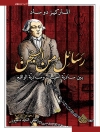Songs of Kabir Rabindranath Tagore – Kabir lived in the 15th Century (1440-1518); born to Mohammadan parents; he came under the influence of the famous Hindu saint; Sri Ramananda and delved deep into the mysteries of Hindu mysticism. A true worshipper of God; he emphasized the purity of mind and selfless devotion to God. He openly opposed the weaknesses of both Hinduism and Islam.During his life time he composed many poems. They are usually two line couplets; known as dohas; recited by many scholars even today to denote some deep philosophical truths.All these songs of Kabir were translated into English by none other than Rabindranath Tagore; the mystic poet and the Noble Laureate; the first edition; published by The Macmillan Company; 1915; New York.This book shall prove to be an asset for the Kabir lovers who can’t enjoy his writings in Hindi.
About the author
Awarded the Nobel Prize in Literature in 1913 ‘because of his profoundly sensitive, fresh and beautiful verse, by which, with consummate skill, he has made his poetic thought, expressed in his own English words, a part of the literature of the West.’Tagore modernised Bengali art by spurning rigid classical forms and resisting linguistic strictures. His novels, stories, songs, dance-dramas, and essays spoke to topics political and personal. Gitanjali (Song Offerings), Gora (Fair-Faced), and Ghare-Baire (The Home and the World) are his best-known works, and his verse, short stories, and novels were acclaimedor pannedfor their lyricism, colloquialism, naturalism, and unnatural contemplation. His compositions were chosen by two nations as national anthems: India’s Jana Gana Mana and Bangladesh’s Amar Shonar Bangla.












